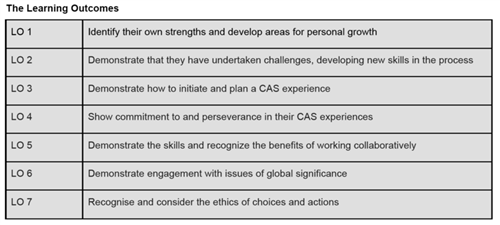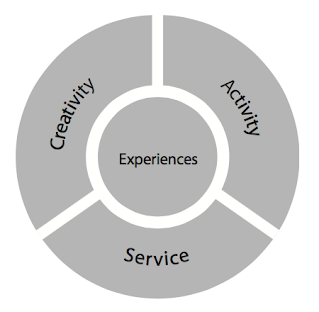-
CAS Overview
CAS (Creativity, Action, and Service) is an element of student life and the graduation requirements for the Diploma Programme at Campus International School. CAS allows students to investigate their interests, passions, and future career paths. It allows students to build experiences that not only help build their resume, but also develop knowledge and skills that can make the student standout for college applications. CAS at Campus International also integrates the opportunity to get hands-on knowledge and experiences around each student’s Extended Essay topic.
CAS at Campus International High School helps students become well-rounded, life-long learners. Our CAS activities, students’ own CAS experiences, and student life at Campus International School are designed to enable the students to be able to show evidence of meeting all of the 7 learning outcomes that the International Baccalaureate requires for meeting the CAS requirement of the Diploma Program. These 7 outcomes are included below:
The Learning Outcomes

What is CAS?
CAS involves student’s extracurricular learning in experiences that involving creativity, action, or service. These are known as the CAS strands. Students must be able to show elements of each of the three strands in their learning.

CAS can involve a one time experience, a series of experiences, or the CAS project (link to CAS Project section below) – a one month or more series of related CAS experiences. Through CAS, students will progress through the five stages of CAS (from the IB CAS Guide) :
- Investigation: Students identify their interests, skills and talents to be used in considering opportunities for CAS experiences, as well as areas for personal growth and development. Students investigate what they want to do and determine the purpose for their CAS experience. In the case of service, students identify a need they want to address.
- Preparation: Students clarify roles and responsibilities, develop a plan of actions to be taken, identify specified resources and timelines, and acquire any skills as needed to engage in the CAS experience.
- Action: Students implement their idea or plan. This often requires decision-making and problem- solving. Students may work individually, with partners, or in groups.
- Reflection: Students describe what happened, express feelings, generate ideas, and raise questions. Reflection can occur at any time during CAS to further understanding, to assist with revising plans, to learn from the experience, and to make explicit connections between their growth, accomplishments, and the learning outcomes for personal awareness. Reflection may lead to new action.
- Demonstration: Students make explicit what and how they learned and what they have accomplished, for example, by sharing their CAS experience through their CAS portfolio or with others in an informal or formal manner. Through demonstration and communication, students solidify their understanding and evoke response from others.
What Counts as CAS?

Campus International has dedicated itself to help students be successful within CAS by providing many CAS experiences thorough the school’s student life offerings. There are many ways a student can gain CAS hours, some of the many opportunities at CIHS are listed below:
School-Based CAS Activities
- E.g. African Drumming Ensemble, Capoeira, Poetry, and Coding
Interscholastic Competitions
- E.g. Debate, Model UN
Athletics
- E.g. Soccer, Track, Rugby, Basketball, Cross Country, Sailing, Crew
Student Organizations and Clubs
- E.g. Blossom and Grow Women’s Club, QSA, March for Our Lives, Yearbook
Field Trips, Service Projects, & Career/College Related Experiences
- E.g. Internships, Shadowing, Interviewing Members of the Community.
Individually Designed Experiences (link to How to get these approved below)
- Student’s own activities they pursue outside of the school setting on their own. There are requirements to meet for these activities to count as a CAS experience.
In order for any of these activities to be officially awarded for hours towards a student’s CAS requirements, a reflection must be completed on the student’s Managebac account and be approved by the CAS coordinator (or their designee).

